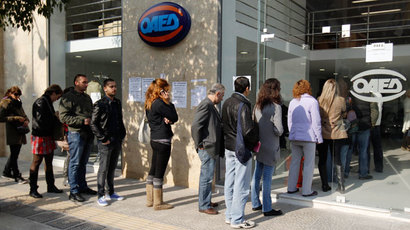Greece to exit EU/IMF bailout deal in 2014 – PM

Greece will exit its EU-IMF bailout agreement in 2014, as scheduled, and will require no further loans, Greek Prime Minister Antonis Samaras said on Monday.
In his address on national television, Samaras said that Greece
“will make the big step to exit the loan agreement" next
year.
“In 2014, Greece will venture out to the markets again [and]
start becoming a normal country,” the prime minister stated.
The Mediterranean country’s debt “will be officially declared
viable, meaning there’ll be no need for new loans and new bailout
agreements,” he added.
Greece, which is going through its sixth year of recession and
has an unemployment rate of more than 27 percent, has been bailed
out on two occasions.
In 2010, the European Union, the International Monetary Fund
(IMF), and the European Central Bank loaned 110 billion euros
(US$151 billion) to the government in Athens. However, the money
injection didn’t work - Greece still found itself on the brink of
exiting the eurozone in 2012.
One year after the first bailout, the country was handed a second
rescue package worth 130 billion euros ($179 billion), as well as
private sector debt write-off totaling more than 100 billion
euros ($138 billion).
The Greek government expects slim economic growth to begin in
2014, alongside a small budget surplus – not counting debt
servicing costs.
Greece hopes to join Ireland, which in December became the first
country to exit an EU-IMF rescue program.
But creditors don’t seem to share the same optimism, expressing
doubts that Athens will be able to meet its 4.4 billion euro
($5.4 billion) loan repayments set for mid-2014.














